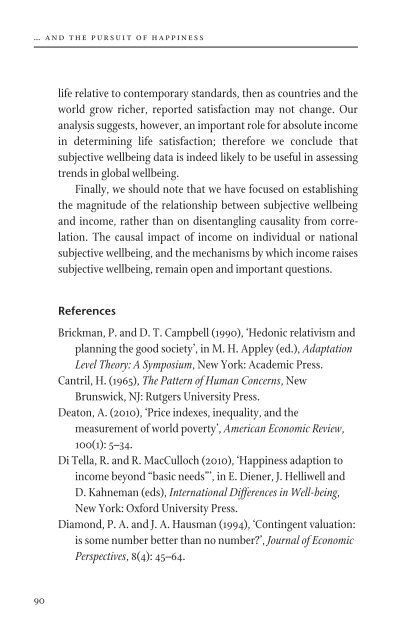… and the Pursuit of Happiness - Institute of Economic Affairs
… and the Pursuit of Happiness - Institute of Economic Affairs
… and the Pursuit of Happiness - Institute of Economic Affairs
Create successful ePaper yourself
Turn your PDF publications into a flip-book with our unique Google optimized e-Paper software.
<strong>…</strong> <strong>and</strong> <strong>the</strong> pursuit <strong>of</strong> happiness<br />
subjective wellbeing<br />
life relative to contemporary st<strong>and</strong>ards, <strong>the</strong>n as countries <strong>and</strong> <strong>the</strong><br />
world grow richer, reported satisfaction may not change. Our<br />
analysis suggests, however, an important role for absolute income<br />
in determining life satisfaction; <strong>the</strong>refore we conclude that<br />
sub jective wellbeing data is indeed likely to be useful in assessing<br />
trends in global wellbeing.<br />
Finally, we should note that we have focused on establishing<br />
<strong>the</strong> magnitude <strong>of</strong> <strong>the</strong> relationship between subjective wellbeing<br />
<strong>and</strong> income, ra<strong>the</strong>r than on disentangling causality from correlation.<br />
The causal impact <strong>of</strong> income on individual or national<br />
subjective wellbeing, <strong>and</strong> <strong>the</strong> mechanisms by which income raises<br />
subjective wellbeing, remain open <strong>and</strong> important questions.<br />
References<br />
Brickman, P. <strong>and</strong> D. T. Campbell (1990), ‘Hedonic relativism <strong>and</strong><br />
planning <strong>the</strong> good society’, in M. H. Appley (ed.), Adaptation<br />
Level Theory: A Symposium, New York: Academic Press.<br />
Cantril, H. (1965), The Pattern <strong>of</strong> Human Concerns, New<br />
Brunswick, NJ: Rutgers University Press.<br />
Deaton, A. (2010), ‘Price indexes, inequality, <strong>and</strong> <strong>the</strong><br />
measurement <strong>of</strong> world poverty’, American <strong>Economic</strong> Review,<br />
100(1): 5–34.<br />
Di Tella, R. <strong>and</strong> R. MacCulloch (2010), ‘<strong>Happiness</strong> adaption to<br />
income beyond “basic needs”’, in E. Diener, J. Helliwell <strong>and</strong><br />
D. Kahneman (eds), International Differences in Well-being,<br />
New York: Oxford University Press.<br />
Diamond, P. A. <strong>and</strong> J. A. Hausman (1994), ‘Contingent valuation:<br />
is some number better than no number?’, Journal <strong>of</strong> <strong>Economic</strong><br />
Perspectives, 8(4): 45–64.<br />
Diener, E. (1984), ‘Subjective well-being’, Psychological Bulletin,<br />
95(3): 542–75.<br />
Diener, E. (2006), ‘Guidelines for national indicators <strong>of</strong><br />
subjective well-being <strong>and</strong> ill-being’, Journal <strong>of</strong> <strong>Happiness</strong><br />
Studies, 7(4): 397–404.<br />
Diener, E. <strong>and</strong> W. Tov (2007), ‘Culture <strong>and</strong> subjective well-being’,<br />
in S. Kitayama <strong>and</strong> D. Cohen (eds), H<strong>and</strong>book <strong>of</strong> Cultural<br />
Psychology, New York: Guilford.<br />
Diener, E., R. E. Lucas <strong>and</strong> C. N. Scollon (2006), ‘Beyond <strong>the</strong><br />
hedonic treadmill: revising <strong>the</strong> adaptation <strong>the</strong>ory <strong>of</strong> wellbeing’,<br />
American Psychologist, 61(4): 305–14.<br />
Dinardo, J. <strong>and</strong> J. L. Tobias (2001), ‘Nonparametric density <strong>and</strong><br />
regression estimation’, Journal <strong>of</strong> <strong>Economic</strong> Perspectives, 15(4):<br />
11–28.<br />
Easterlin, R. A. (1973), ‘Does money buy happiness?’, The Public<br />
Interest, 30: 3–10.<br />
Easterlin, R. A. (1974), ‘Does economic growth improve <strong>the</strong><br />
human lot? Some empirical evidence’, in P. A. David <strong>and</strong> M.<br />
W. Reder (eds), Nations <strong>and</strong> Households in <strong>Economic</strong> Growth:<br />
Essays in Honor <strong>of</strong> Moses Abramowitz, New York: Academic<br />
Press.<br />
Easterlin, R. A. (1995), ‘Will raising <strong>the</strong> incomes <strong>of</strong> all increase<br />
<strong>the</strong> happiness <strong>of</strong> all?’, Journal <strong>of</strong> <strong>Economic</strong> Behavior <strong>and</strong><br />
Organization, 27(1): 35–48.<br />
Easterlin, R. A. (2005a), ‘Feeding <strong>the</strong> illusion <strong>of</strong> growth <strong>and</strong><br />
happiness: a reply to Hagerty <strong>and</strong> Veenhoven’, Social<br />
Indicators Research, 74(3): 429–33.<br />
Easterlin, R. A. (2005b), ‘Diminishing marginal utility <strong>of</strong> income?<br />
Caveat emptor’, Social Indicators Research, 70(3): 243–55.<br />
90 91












